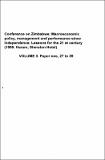| dc.contributor.author | Mufema, Edmore | |
| dc.coverage.spatial | Zimbabwe. | en |
| dc.date.accessioned | 2015-12-09T09:47:51Z | |
| dc.date.available | 2015-12-09T09:47:51Z | |
| dc.date.issued | 1998-08 | |
| dc.identifier.citation | Mufema, E. (1998) A political economy of indigenisation of the Zimbabwean economy, Conference on Zimbabwe: macroeconomic policy, management and performance since independence: lessons for the 21st century, Paper 30. Harare: University of Zimbabwe. | en |
| dc.identifier.uri | https://opendocs.ids.ac.uk/opendocs/handle/20.500.12413/7186 | |
| dc.description | A conference paper on the pros and cons of indigenising the Zimbabwean economy. Originally prepared for: "Conference on Zimbabwe: macroeconomic policy, management and performance since independence: lessons for the 21 st century," 19-21 August, Sheraton Hotel, Harare. | en |
| dc.description.abstract | Firstly, indigenisalion of ownership of the means of production aims at giving the indigenes of the country, either individually or collectively, ownership of the economic establishments of their country. This can be accomplished through either public or private ownership of the means of production or through a combination of both means. Secondly, indigenisation ofcontrol of the means ofproduction seeks to enable the indegenes of the country to have access to policy making boards of economic enterprises of the country. Adedeji argues that while it is possible to have indigenisation of ownership without access to the control of the means of production, the reverse, ie, indigenisation of control without ownership is at best weak and fragile.2 The third type of indigenisation is the most common within African countries. It is the indigenisation of the manpower. Soon after independence many nationalist governments took it upon themselves to Africanize the civil service and even private companies went along with the programmes by hiring a number of Africans in their operations and management of organizations. These Africanization programmes were motivated to put the indigenous people into the driving seats of political and economic programmes of their countries. However, the indigenisation of manpower without corresponding transformation in the ownership and control patterns is a deceptive and ineffectual means of indigenising African economies. Finally, there is the indigenisation of technology. Due to the obvious need to develop the African economies, African states have been continuously acquiring technology from the developed countries. | en |
| dc.language.iso | en | en |
| dc.publisher | Department of Economics, University of Zimbabwe (UZ) | en |
| dc.rights.uri | http://creativecommons.org/licenses/by-nc-nd/3.0/ | en |
| dc.subject | Economic Development | en |
| dc.title | A political economy of indigenisation of the Zimbabwean economy | en |
| dc.type | Conference paper | en |
| dc.rights.holder | University of Zimbabwe (UZ) | en |


